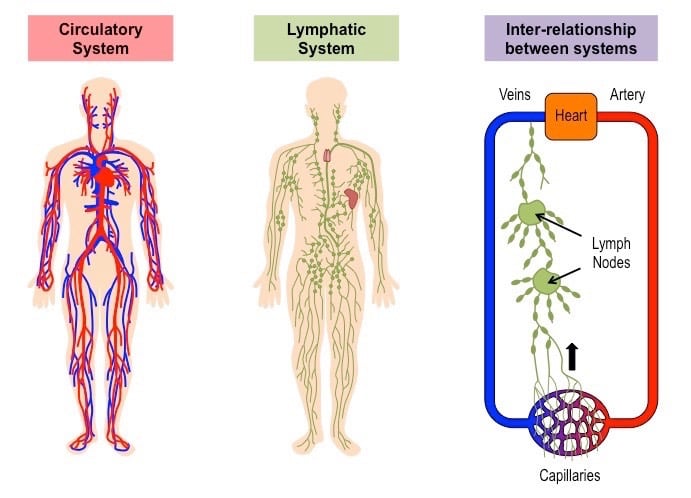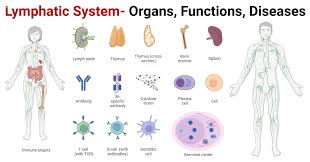Lymphatic system detox clears cancer
The Vital Role of the Lymphatic System in Detoxification and Cancer Management
The lymphatic system is a complex network of vessels, nodes, and organs that plays a crucial role in maintaining the body's immune functions, fluid balance, and removal of waste products. It operates parallel to the circulatory system, primarily focusing on managing lymph flow, which comprises white blood cells, waste, and toxins. When the lymphatic system is functioning optimally, it can actively support the immune system in combating diseases, including cancer. Lymph nodes play a part in this too.
Lymphatic System
The lymphatic system consists of lymphatic vessels, lymph nodes, lymph capillaries, lymph fluid, and various lymph glands scattered throughout the body. Its primary functions include:
1. Balancing Fluids: By collecting excess fluid that builds up in body tissues and returning it to the bloodstream, the lymphatic system prevents fluid retention and swelling, a condition known as lymphedema.
2. Immune Response: The lymphatic system houses a significant number of immune cells, including T cells and B cells, which are critical for identifying and fighting foreign invaders, including bacteria and abnormal cells like cancer cells.
3. Nutrient Absorption: The lymphatic system also aids in the absorption of fats and fat-soluble vitamins from the digestive system.
4. Clearance of Waste Products: As body tissues undergo metabolic processes, they generate waste products that the lymphatic system helps remove. ## Lymph Nodes and Immune Function Lymph nodes, small structures located along the lymphatic vessels, filter lymph fluid as it passes through. They trap harmful substances, including cancer cells, and signal the immune system to activate white blood cells to respond to these threats. A swollen lymph node is often a sign that the body is actively fighting an infection or disease. In cancer management, swollen lymph nodes can indicate metastasis, where cancer spreads from the original tumor site. Understanding the relationship between lymphatic health and cancer can give valuable insights into prevention and treatment strategies.
Lymphatic Drainage Techniques
Several techniques can promote lymphatic health, aiding in detoxification and reducing the risk of cancers and chronic illnesses. Key methods include
Rebounding. Rebounding will mobilize your lymphatic system just like the listed therapies below... It fulfills a lot of health needs. It is excellent at moving the one way lymphatic system check valves, getting fluids to flow through the lymph vessels.
1. Lymphatic Drainage Massage Lymphatic drainage massage is a gentle form of massage designed to stimulate lymph flow and promote detoxification. The technique utilizes light pressure and rhythmic movements to facilitate the movement of lymph fluid through lymph vessels and lymph glands, aiding in the reduction of swelling and enhancing immune function. Certified lymphedema therapists often perform this type of massage to relieve lymphedema in cancer patients post-surgery, such as breast cancer surgery, where lymph nodes might have been removed.
2. Manual Lymphatic Drainage Manual lymphatic drainage is a specialized therapy that focuses on the precise manipulation of lymph vessels and nodes to encourage proper lymph fluid circulation. This therapeutic technique not only helps in fluid retention but also supports the body's immune system by ensuring that toxins and waste products are effectively eliminated.
3. Physical Activity Regular physical activity can significantly impact lymphatic circulation and overall health. Engaging in movement stimulates the contraction of working lymph vessels, which helps push lymph fluid through the system. Exercise also promotes blood circulation, further supporting the lymphatic system and aiding in detoxification.
4. Healthy Lifestyle Choices A healthy diet rich in antioxidants, vitamins, and minerals can bolster immune function and the lymphatic system's efficacy. Consuming plenty of fruits and vegetables, staying hydrated, and limiting processed foods and sugars can contribute to a healthier lymphatic system. Chronic conditions like rheumatoid arthritis can affect lymphatic function, making lifestyle choices even more critical.
5. Hydration and Rest Staying well-hydrated aids lymph fluid balance and facilitates toxin removal. Adequate rest is also essential, as it allows the body to recover and maintain optimal function. A well-functioning lymphatic system relies on a healthy circulatory system, so ensuring adequate blood flow through hydration and rest is vital.
The Connection Between Lymphatic Health and Cancer
Emerging research indicates a profound relationship between a healthy lymphatic system and its role in combating cancer. The body's immunities, supported by the lymphatic system, is crucial for identifying and destroying abnormal cells like cancer. T cells and B cells, types of white blood cells, are particularly important in orchestrating the immune response against cancer. When the lymphatic system is compromised, as can occur in cases of chronic venous insufficiency or following cancer treatments that involve lymph node dissection, the risks of developing lymphedema and subsequent complications can increase. This fluid accumulation may inhibit the body’s ability to clear damaged red blood cells and cancer cells effectively.
Detoxification and Cancer Prevention lymph nodes
Detoxification through the lymphatic system is not about harmful detox diets but rather maintaining the system's health and efficiency. Activities that promote lymphatic flow not only reduce the risk of conditions like lymphedema but can also lower the risk of developing cancers by ensuring that your immunities can actively manage and eliminate any abnormal cells, including precursors to cancer.
1. Supporting Immune Mechanisms
By efficiently clearing waste products and toxins, the lymphatic system helps maintain an environment in which immune cells can thrive. Components such as T lymphocytes and B lymphocytes continually monitor tissues for signs of abnormalities or infections. When the lymphatic system is healthy and functional, it enhances the immune response, allowing for faster detection and mitigation of cancer cells.
2. Toxin Elimination and lymph fluid
The lymphatic system is integral to removing toxins from the body. Accumulation of environmental toxins, inflammatory agents, and waste can lead to cellular damage and cancer development. The lymphatic drainage process assists in flushing out these harmful substances, allowing cells to maintain their integrity and function properly.
3. Enhanced Blood Circulation
The lymphatic system is closely tied to the circulatory system. When lymph fluid circulates effectively, it facilitates better blood circulation, which ensures that nutrients and oxygen reach tissues while also aiding the removal of metabolic waste. A robust circulatory system can improve overall health and increase the body’s resilience against diseases, including cancer.
4. Preventing Inflammation
Chronic inflammation is recognized as a contributing factor in the development of cancer. The lymphatic system plays a vital role in mobilizing immune cells to sites of inflammation. A well-functioning lymphatic system can effectively manage and reduce inflammation, potentially lowering the risk of cancer.
Techniques for Promoting a Healthy Lymphatic System
Using the rebounder, your can perform a lot of techniques that you normally hear of but you can do it on your own effectively, efficiently get positive results with a lymphologist...
1. Lymphatic Drainage Techniques
Gentle Massage
Incorporating gentle lymphatic massage via rebounding into one’s routine can promote lymph flow. This can help relieve fluid retention, support immune function, and assist in detoxification, thereby contributing to overall health.
Breathing Exercises
Deep abdominal breathing techniques encourage the movement of lymph fluid. The pressure changes in the abdomen promote lymph flow back toward the thoracic duct, where it drains into the bloodstream.
Contrast Hydrotherapy
Alternating between hot and cold compresses can stimulate the lymphatic vessels and improve circulation. Hot water encourages dilation, while cold water constricts blood vessels, creating a pumping action that can aid in lymph drainage.
2. Physical Activity
Incorporating regular physical activity into daily life can significantly impact lymphatic function. Activities that promote movement, such as walking, swimming, or yoga, encourage the natural contraction of lymph vessels, enhancing lymph flow.
3. Nutrition
A diet high in fiber, healthy fats, and plant-based foods can support lymphatic function and overall immune health. Specifically, foods rich in omega-3 fatty acids (like fish and flaxseed) and antioxidants (from colorful fruits and vegetables) can reduce inflammation and support cellular health. It is very good to have an anti-oxidant diet.
4. Awareness of Health Conditions
Being attentive to conditions that can affect lymphatic health is crucial. For example, chronic venous insufficiency can impair lymphatic function. Understanding how certain medical treatments, like those for breast cancer, can affect lymph nodes will empower patients to seek appropriate interventions, such as lymphatic drainage therapy.
5. Consult Healthcare Providers
Working with healthcare providers, lympholgists, to develop individualized plans for maintaining lymphatic health can lead to better outcomes, particularly for those who have undergone cancer treatments. Engaging with certified lymphologist can also provide tailored guidance to optimize recovery and health goals.
Conclusion
The lymphatic system plays an indispensable role in the body’s ability to detoxify, fight infections, and manage abnormal cells that could lead to cancer. By understanding how this system operates and how to support it through techniques like lymphatic drainage massage, physical activity, and healthy lifestyle choices, individuals can enhance their immune resilience and potentially reduce the risk of cancer. Investing in the health of the lymphatic system is not just about detoxification; it is about embracing a holistic approach to health that encompasses diet, exercise, and mindfulness about bodily functions. As research continues to evolve, the message remains clear: a healthy lymphatic system fosters a healthier body, resilient against diseases, including cancer.











Immune
Learn about lymphatic system and body detox benefits today.
Health
Cleanse
343-999-9498
© 2024. All rights reserved.
